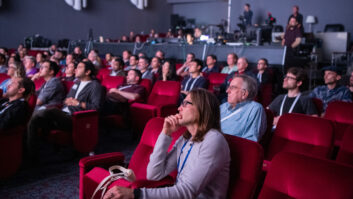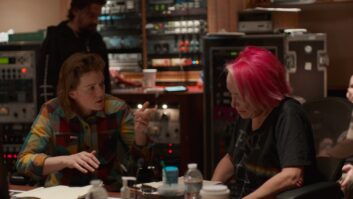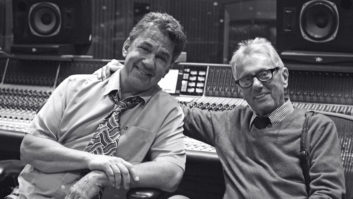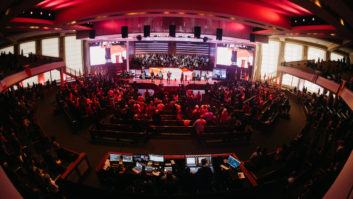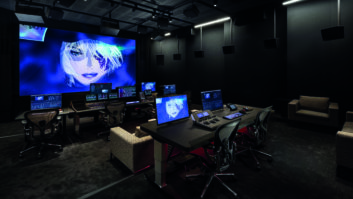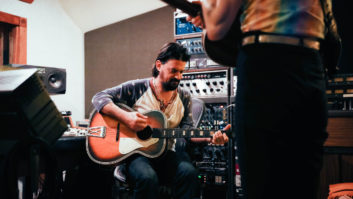Jim DeMain and his high-end mastering facility, Yes Master Studios, are both no strangers to change. Just over a decade ago, DeMain began to reevaluate his role in the world of studio recording, having spent the better part of 20 years in the business.
Yes Master Studios has made a dramatic comeback from
the devastation of the flood that struck Nashville last May. “Budgets were changing, and the projects I was starting to work on were more of an independent nature. I began to recognize that a lot of my clients couldn’t really afford to master their projects at a highend facility.” DeMain decided to push his own skill set and grasp what he saw was an emerging opportunity. “I started doing it myself on my own projects, and before I knew it, people were calling me to do their records, telling me that they really liked what I was doing.”

Many of Yes Master’s clients at the time were indie artists making their own records; they were either completely on their own, or affiliated with a producer or small independent label. “Strangely enough, this is also where my heart was,” DeMain recalls. “I like working on those kinds of records, and enjoy working with those kinds of clients. It can be very exciting to take somebody’s project and help them take it to the next level.”
After about a year of pursuing— and succeeding with—more and more mastering work, DeMain began to take a serious look at his equipment infrastructure. Since his mixing work now represented a marginal percentage of his overall workload, he began offloading “recording”-type equipment and began acquiring a serious arsenal of mastering equipment. “I got rid of my Neve and API stuff and started getting super-high-end compressors and equalizers, like the Weiss stuff,” he reveals. “I sold my tube microphones and upgraded my monitors, my power amp and my converters. With each element that I upgraded, I could notice a difference.” DeMain also began to listen attentively to the work of other mastering engineers that he admired. “I would ask myself, ‘How did they get that extra dimension I hear?’ and I would decide that I needed a better clocking device, because that is really going to make a difference.”
DeMain’s fervent dedication (and his investment) ultimately led him to bigger clients and bigger budgets as he carved out his niche. “Once I got clients like Warner Brothers, I decided I had to up the game, so I rented a commercial space and hired acoustic designer Carl Tatz.” Tatz designed the new Yes Master facility, and installed a Carl Tatz Design Phantom Focus monitoring system, which DeMain felt was key in pushing his facility out in front of so many others. “We moved into the space, and all my clients really appreciated it. I was absolutely blown away by what I could hear, and it occurred to me that that is probably the most important thing for a mastering facility to have is a really accurate monitor system. You can buy all the fancy compressors you want, but if you can’t hear what they are doing, it doesn’t really matter.”
With a newly designed facility— complete with high-end mastering equipment and a Carl Tatz Designs Phantom Focus monitoring system— DeMain had taken his facility to its highest point just before tragedy struck in Nashville, with the flood of May 2010. Even though DeMain took every precaution he could, such as sealing doors and sandbagging the exterior of the facility, there was no stopping Mother Nature. There was also no preparing for what he experienced the morning of Tuesday, May 4: “I had three feet of water in my studio and was completely wiped out,” he says.

In all the devastation that surrounded not only his studio but much of the city of Nashville, DeMain was quickly able to spot his friends: “Aside from Alex Mc- Collough, the other engineer that works with me at the studio, Carl [Tatz] was the first guy there, and had arrived shortly after me. He had already called my insurance company and told me, ‘Don’t worry, we’re going to put this back together better than it was.’
It took a lot of strength from DeMain to put all that behind him, but sure enough, nine months passed and the studio was back and in better form than ever. “We had looked at everything and improved it. For example, we put the power amps on 220 current; Carl also changed the monitor setup, the processor and the whole front-wall diffusion array.” The difference these changes made was audible: “When I sat down in front of the new Phantom Focus system, I almost could not believe what I was hearing. I was listening to records I thought I knew, and I heard an entirely new musical dimension that I didn’t even know existed. It was mind-blowing how great it was.”
Now, DeMain’s course seems more certain than ever. Having established a highly successful mastering business, he is able to appreciate not only how Yes Master has grown into a first-class mastering facility, but perhaps more importantly, how much more he enjoys it. “Financially and psychologically, it has been the right move for me. When you are 20 or 30 years old, you don’t mind staying up all night working with rock bands; that’s part of who you are at that age. But as you start getting older, being at the studio all night isn’t quite as exciting as it used to be. I’ve got a lot more balance in my life now,” he observes.
“I like listening to recordings holistically and find this way of working so much more enjoyable,” he says about mastering. “I like driving the car, but it’s still nice to know how everything works under the hood.” Currently, there is nothing slowing DeMain down: He’s got projects in the pipeline with Vince Gill, along with an array of both local and international acts. He’s been especially impressed by the growth of one of his clients, Justin Earle: “He’s the real deal now, and was just recently on Letterman. It is fascinating to see some of these artists grow and develop.”
Jeff Touzeau is a regular contributor to Pro Sound News. His most recent book is Sound Ideas for a Sound Planet: The Green Musician’s Guide(Cengage).

